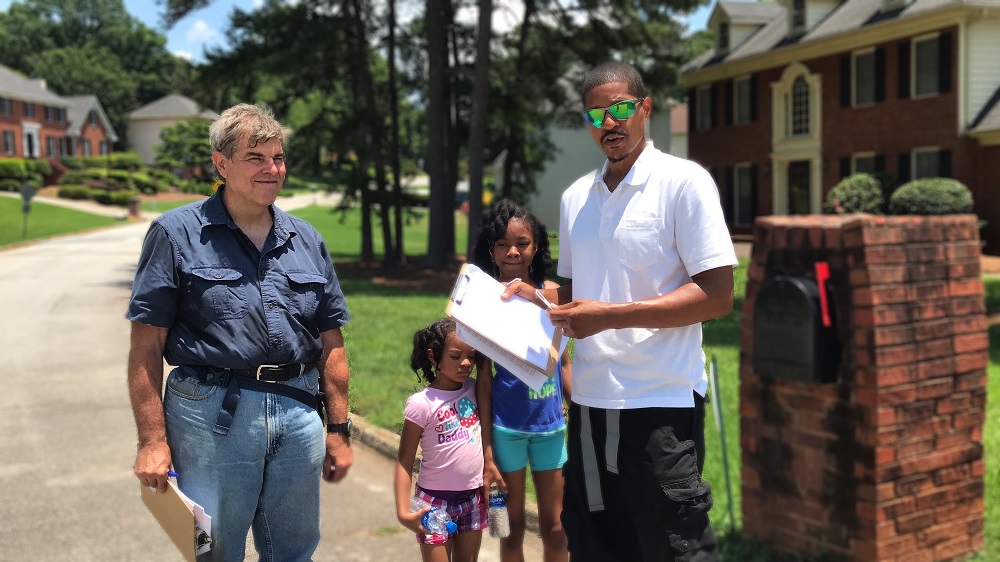It’s a hot 95 degree and humid Sunday afternoon and I’m getting a tutorial from Mark Mosely, a Libertarian party member who has been fighting the good ballot access fight for almost two decades. Mark is going over the protocol he has designed to help Libertarian candidates get petition signatures so that they can get on the ballot. Mark takes his time explaining the history of petitioning and his dedication to helping candidates with such an arduous task. I agree to shadow Mark to get a feel for the process and learn his approach speech. Candidate for Georgia House District 90, Demond Kennedy heads out ahead of us with his two daughters, bottles of water, and petitions.
I’m an avid mountain biker and hiker and about an hour into this process I’m exhausted, both mentally and physically, and we’ve only collected a handful of signatures. I had a time restraint and blisters on both of my feet, so I left Mark and Demond to finish canvasing the neighborhood. On my hour drive home, I couldn’t help but to think how inequitable and punitive this process is for those who don’t belong to the Democrat or Republican parties.
There are three basic methods by which an individual may become a candidate for office in a state:
- An individual can seek the nomination of a state-recognized political party.
- An individual can seek the nomination of a state-recognized political body, like the Libertarian Party, or run as an independent. Political Body and Independent candidates often must petition in order to have their names printed on the general election ballot.
- An individual can run as a write-in candidate.
Jay Strickland, Libertarian candidate for Georgia House District 42, stated: “Georgia has some of the most restrictive ballot access laws in the United States. Independents and third party candidates have to petition just to get in the race. But Democrats and Republicans just pay their way onto the ballot. Even in races like mine where there is only one person on the ballot.” These are Georgia’s particular stipulations for Independent candidates:
- For a candidate seeking statewide office in Georgia, the petition must be signed by registered voters equal in number to 1 percent of the total registered voters eligible to vote in the last election for the same office the candidate is seeking.
- For candidates seeking any other office, the petition must be signed by registered voters equal in number to 5 percent of the total registered voters eligible to vote in the last election for the same office the candidate is seeking.
- Petitions cannot be circulated for more than 180 days between the signing of the first signature and the last.
How do these restrictions translate into man power and effort? Ryan Graham, Vice Chair of the Libertarian Party of Georgia and candidate running for Public Service Commission District 3, also went out to petition for Demond Kenneday for Georgia House District 90. He reported that in addition to the heat it began pouring down rain so he huddled under a bush for cover. While he was waiting out the rain he had some time to reflect and reported that, “Demond has to collect 1,800 valid signatures from registered voters to even get on the ballot. Over the course of 3 hours, and many open doors, I had only two signatures, and at least one door slammed in my face. When the temperature wasn’t in the 90’s, I was drenched by pouring rain. Many were uneasy at even opening the door to a stranger on a Saturday afternoon and simply spoke to me through the door. It was near impossible to understand anything that was said in those instances. Ballot access requirements for Third Parties and Independents are over the top, and designed to decrease competition at the ballot box. Most people who said, ’No,’ to me said that they didn’t know enough about Demond to sign today. The Republicans and Democrats don’t require constituents to ’know‘ them before they get on the ballot. They simply pay their filing fee and fill out the paperwork and they are on the ballot.”
Experiencing this process demonstrates that we need real ballot access reform in Georgia. The current laws are not just a barrier for choice but they are discriminatory and constructed to set up candidates outside the two party system for failure. The Libertarian Party of Georgia is working to change the ballot access laws at the root wherever we can. We have a ballot access suit against the Secretary of State’s office that is currently in the discovery process. And there is an active bill in the state Senate, SB 112, that we are seeking representation for the upcoming 2019 Legislative session. SB 112 would remove the requirement that independent and political body candidates file nomination petitions for ballot access.
Demond Kenneday stated: “The ballot access laws for Independents and Third Parties are unfair and unjust, but until the law is changed, unfortunately we have to knock on doors to get people who are registered to vote within my district to sign.” ALL Third Party and Independent candidates should be able to have their voices heard. Libertarians believe free markets bring us the best possible outcomes, and a free market of ideas is no exception. Let us on the ballot and let the PEOPLE decide!

